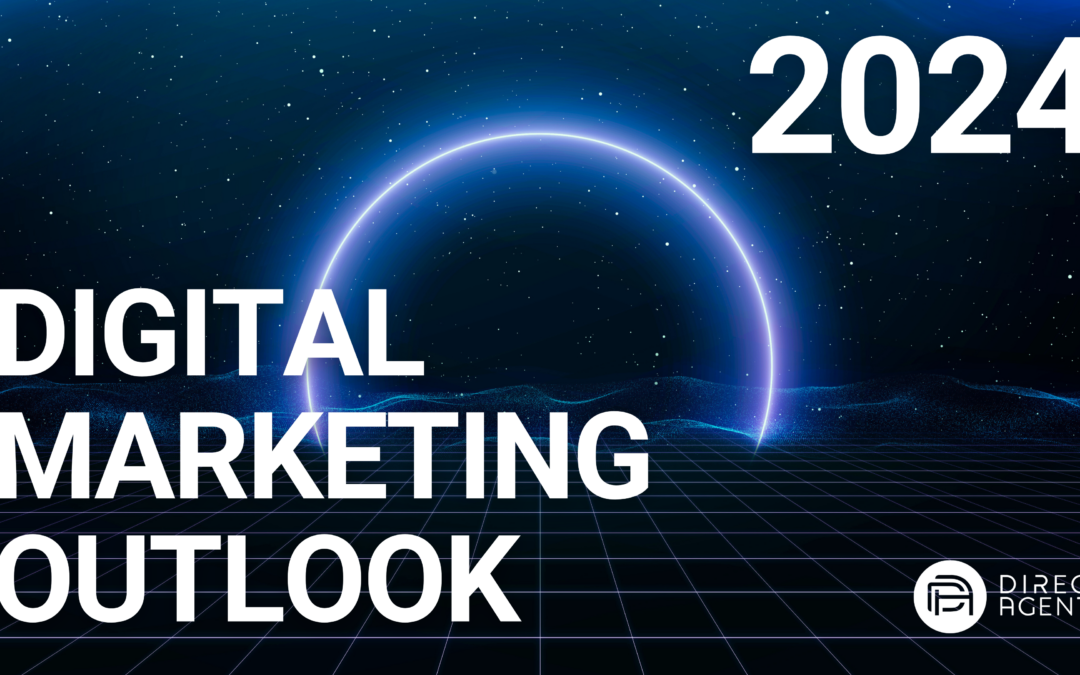We asked our digital experts to weigh in on the pivotal trends shaping the digital marketing landscape in 2024. Their insights cover a range of key areas, from AI integration in search and PPC to strategic brand positioning in AI-driven markets. They provide an in-depth look into the evolving dynamics of eCommerce, the nuances of AI in digital media buying, and the critical role of multi-device measurement and media mix modeling. Here’s what they had to say about these transformative trends and how they’re preparing to leverage these developments to the advantage of our clients at Direct Agents.
Artificial Intelligence (AI) Integration in Search
Cari Bacon, Associate Director of SEO
The integration of Generative AI in SEO is revolutionizing how we find information. Tools like Bing Chat, Google SGE, ChatGPT, and Bard provide personalized responses, often including resourceful links within AI chat results. This advancement, similar to the incorporation of “Answer Boxes” and “People Also Asked” by Google, offers new opportunities for brands. Embracing these technologies, brands can maintain authority and attract qualified traffic by ensuring their websites are technically sound and filled with useful, original content. This adaptation to AI chat search offers a competitive edge and a future-proof SEO strategy.
Navigating AI in Pay-Per-Click (PPC)
Avery Klondar, Senior Search Analyst
The PPC advertising landscape is rapidly evolving with the integration of AI across ad accounts. AI has introduced new challenges for advertisers, particularly in bidding algorithms. The use of AI in these algorithms has created a ‘black box’ effect, reducing transparency in audience and placement effectiveness. The Direct Agents team has employed innovative solutions like custom scripts, access to Beta versions for Performance Max conversion paths, and controlled experiments for AI bidding impact analysis. Our focus is on quickly adapting to new AI tools, including the Generative AI Beta, Broad Match, and advanced smart bidding strategies. Staying ahead in utilizing AI is crucial as advertising platforms increasingly depend on and fine-tune this technology.
Brand Strategy in AI-Driven Markets
Jackson Richards, VP of Strategy
In today’s AI-driven markets, a solid brand strategy and positioning are vital for business growth. The rapid technological advancements, especially in generative AI, have reshaped consumer interaction and brand perception. A well-crafted brand strategy acts as a guide, helping companies stand out and establish a memorable presence. It’s essential to align AI tools with brand values to enhance customer experiences authentically. This strategic approach drives customer loyalty and sustainable growth in a competitive, tech-savvy market.
eCommerce: Streaming TV & Expanding Products
Bridget Menne, Client Success Supervisor
The eCommerce sector is set for a transformative year with technological advancements and changing consumer habits. Streaming TV advertising, particularly on Amazon, offers novel ways for brands to connect with audiences through personalized video ads. Expanding product offerings in major retailers like Walmart and Target is critical for reaching a wider customer base. This omnichannel strategy offers consumers more choices and drives the industry’s growth.
AI in Digital Media Buying
Trevor Clune, Director of Paid Media
The digital media buying landscape is increasingly influenced by AI and social media buying algorithms. The shift from extensive audience research to AI-driven strategies means algorithms can better identify ideal customers. Success in media buying now depends on training these algorithms in harmony with marketing goals. Adopting a structured testing approach within media planning allows algorithms to learn and improve, positioning marketers at the forefront of digital media buying.
Multi-Device Measurement & MMM
Joe Belafonte, VP of Data Science & Experience
In a world where multi-device interactions are the norm, marketers require innovative measurement solutions. Media Mix Modeling (MMM), powered by machine learning, provides valuable insights for optimizing media spend and campaign strategies. Direct Agents’ Feather AI democratizes MMM, offering sophisticated data analysis to a broader range of businesses. This tool enables marketers to assess the impact of their investments across channels and make data-driven decisions for future campaigns.
Efficiency in Influencer Marketing
Katherine Grabowsky, Supervisor of Creative & Influencer
As influencer marketing grows, creating budget efficiencies becomes a priority. Integrating AI into influencer workflows allows for detailed creator analysis and campaign refinement. The use of AI tools on platforms like YouTube helps influencers speed up editing and align video content with audience interests. Post-campaign analysis, live shopping, and anchor links provide direct attribution metrics, guiding brands toward efficient content spend. Utilizing UGC content in paid and organic platforms also enhances campaign efficiency.
Emerging Trends in Digital Marketing
Corey Levine, VP of Integrated Media
Digital marketing is rapidly evolving, with key trends emerging for 2024. The phase-out of 3P cookies in Chrome will impact data matching and scale, necessitating new approaches in data use. The rise of TikTok as a brand discovery tool and its surpassing of Google in searches among Gen Z calls for a shift in marketing strategies to align with consumer behavior. Personalization, authenticity in messaging, and the increase in CTV inventory will drive changes in advertising approaches. In response, Direct Agents is positioning itself and its clients for success through strategic planning and partnerships.

